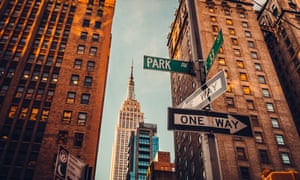In just 11 years, it has grown from nothing to a $30bn firm. But critics say Airbnb’s rise has come at a huge cost to urban life – and cities across the planet are trying to find ways to rein it in.
Rowan Hughes stayed in Airbnb accommodation on holidays for several years before she decided to make some extra cash from her own home in south-east London. When refurbishing the property, she created a room with an en-suite bathroom and its own front door, listing it on the accommodation-sharing platform at the start of this year.
Hughes, 37, considered getting a lodger, but using Airbnb offered the flexibility to reclaim the room when her own friends and family came to stay. So far, she has mainly attracted business travellers, who prefer her homely atmosphere and £50-a-night charge to nearby chain hotels where soulless rooms cost significantly more.
“I make it clear on the listing that it’s a family home, so guests know what to expect,” she said. “It’s still early days but it has been great. It brings in some extra cash for holidays or things for the children, and it’s a competitive price for my visitors. It works for everyone, and I don’t want to be greedy.”
Hughes is exactly the kind of host the founders of Airbnb had in mind when they launched the business in 2008. Joe Gebbia and Brian Chesky dreamed up the idea of a website that would allow people to rent out a spare room for the odd night or two after they charged three guests $80 each to sleep on airbeds in their San Francisco apartment when every hotel room in the city was taken.
Eleven years on, Airbnb’s site lists more than six million rooms, flats and houses in more than 81,000 cities across the globe. On average, two million people rest their heads in an Airbnb property each night – half a billion since 2008.
London, Paris and New York have the biggest number of listings, but Airbnb accommodation is available in Mandalay, Ulaanbaatar and Brazzaville.
Some residents in areas with a big Airbnb presence claim the business is hollowing out communities
Last year, Forbes estimated the business to be worth $31bn (£23bn). In the coming months, Airbnb is expected to become a listed company, with an initial public offering netting enormous wealth for Gebbia, Chesky and co-founder Nathan Blecharczyk.
But Airbnb’s extraordinary success has not been welcomed unreservedly. Some residents in areas with a big Airbnb presence claim the business is hollowing out communities by forcing up rents and limiting availability for people seeking long-term lets, and importing large numbers of tourists who display scant interest in courtesy to their temporary neighbours.
Social media and websites such as airbnbhell.com abound with stories from hosts, guests and neighbours of excessive noise, trashed homes, wild parties, last-minute cancellations and scams. But they are matched by positive experiences from satisfied travellers who have found affordable alternatives to hotel rooms.
Many local authorities are implementing or exploring regulation to mitigate the negative impact of short-term rentals.
In London – where more than 77,000 homes are listed on Airbnb, a fourfold increase since 2015 – mayor Sadiq Khan last month called for a registration scheme for people renting properties on a short-term basis. Since 2015, a legal cap of 90 nights a year for short-term rentals in London has been in place, but it has proved almost impossible to enforce.

City Hall acknowledged that the 2.2 million guests who stayed in short-term rentals in the year to July 2018 generated £1.3bn for the local economy, but said the time had come for a mandatory registration system for hosts and zero tolerance for those trying to flout the 90-night limit.
James Murray, deputy mayor for housing, told the Observer: “In principle, a good balance can be struck. Londoners can make a bit of extra money by renting out their homes, and visitors can have more options for places to stay. But that does have to be balanced against protecting long-term rented housing in London and the impact on neighbours of people coming and going. In some areas, the balance is not being struck.”
Airbnb – which backed the mayor’s call – takes measures to enforce the 90-night cap with its hosts. Other accommodation platforms are less compliant, the mayor’s office said.
An Airbnb spokesperson said the company wanted to be “a good partner to the places in which our hosts live… We have already collaborated and worked with over 500 governments to help hosts share their homes and follow the rules.”
The spokesperson said “countless studies” had shown that Airbnb had no significant impact on housing, adding: “We always welcome working with local authorities and partners on how we can ensure hosting and home sharing continues to grow responsibly and sustainably, and help spread the benefits of tourism to local families, small businesses and their communities.”.
Last week an adviser to the European Court of Justice said the company – which is registered in Ireland – should be regarded as a digital service provider rather than a real estate business. This could exempt it from onerous regulation. Airbnb has spawned competitors though none has matched its scale. Marriott International recently said it would become the first global hotel chain to launch a home-rental business. Hilton and Hyatt are considering similar moves.
Meanwhile, Airbnb is moving into the hotel business, partnering a New York developer to turn commercial properties in the city into a “new category of urban lodging”. The first venture will be to convert 10 floors of the Rockefeller Plaza in Manhattan into “high-end apartment-style suites”.
At the other end of the spectrum, Fairbnb, a co-operative “seeking to create a just alternative to existing home-sharing platforms”, will launch in five European cities next month. The venture is committed to sustainability, transparency and compliance with local and national legislation. Its hosts will be permitted to advertise only their own homes, and the co-op’s 15% commission fee will help local development projects.
Fairbnb is perhaps closer to Gebbia and Chesky’s original vision for community-based tourism than the behemoth that Airbnb has become. Although most Airbnb hosts in the UK – 76% – let out their own homes for extra cash, the platform is increasingly used by business people who own or manage multiple properties.
Housing activists and analysts say that some landlords have shifted from offering long-term tenancies to more profitable short-term lets. In some places, they say, properties are being turned into de facto hotels or hostels, with locks on individual rooms, to maximise income.
In London, according to database Inside Airbnb, 11 hosts have more than 100 properties listed on the site. Almost a quarter of London hosts list five or more properties. Other big cities show similar trends.
Alex, 31, who has two central London properties on Airbnb, hopes to expand. “I see this as the future. It’s not so attractive to let properties now,” he said, citing the government’s increased taxation of buy-to-let property. A lot of landlords have had to sell up, but those who’ve managed to stay afloat have had to get creative. From the standpoint of making a profit, Airbnb is a good thing.”
“70,000 homeless but thousands of apartments to rent”

On his way to work on the morning of 1 May, Axel Avin, 36, was stopped in the Nostrand Avenue subway station in Brooklyn by a French family trying to figure out which MetroCard to buy.
Three years ago, the tourists would have stuck out in that part of the Bedford-Stuyvesant neighbourhood.
For years, the area has been home to predominantly working-class families. Outside the subway station is a Taco Bell, Burger King and a handful of mom-and-pop shops mixed with empty, graffitied storefronts.
But with Airbnb, it’s now common to see tourists milling about, trying to make their way out of Brooklyn to the skyscrapers of Manhattan.
“It’s like a neighbourhood that’s made up of older either African-American families that have been here, or younger gentrifiers who are white and in their 20s,” said Avin, who has lived in the area for 12 years. “Then you see a European 50-year-old couple with their suitcase walking down the street. It stands out.”
Despite hosting a massive Airbnb presence – New York is its third largest market, with an estimated 50,000 listings in every corner – the city has been a battleground for the company.
City and state politicians have made it legally complicated to be an Airbnb host, attempting to prevent landlords and real estate agents from putting apartments on Airbnb that could have gone to permanent residents. State law prevents renting out apartments in most buildings for less than 30 days unless the hosts live permanently in the same space.
Fears of using Airbnb for lucrative real estate schemes are not misguided. The city filed a $21m lawsuit against a group of real estate brokers who are accused of using Airbnb to rent out 130 apartments in the city. The restrictions have been supported by housing campaigners, who see the company as a factor in rising rents and gentrification.
“We have a massive homelessness crisis, we’re coming up on 70,000 homeless people in the city, and we have thousands of apartments listed essentially as hotel rooms,” said Jonathan Westin, executive director of housing rights group New York Communities for Change.
Airbnb is defending itself. A federal judge has temporarily blocked a city statute that would have forced the company to disclose information about its hosts, which would have made it easier to enforce restrictions.
The company argues that New York politicians have been influenced by the powerful hotel lobbyists, once putting up a list of New York City Council members and how much money they take from “big hotels”. Any restrictions, they argue, hurt middle-class New Yorkers who are trying to make some money on the side and tourists who are looking for a cheaper place to stay, all because of a few bad actors.
Ed, 27, who rents out a one-bedroom apartment through Airbnb in the East Village, said being a host has helped him pay for school as he works to get his bachelor’s degree. Ed declined to provide his last name for fear of legal repercussions in light of New York’s Airbnb restrictions.
“It [Airbnb rental income] is putting me through school… without having to work at restaurants and shit, which would have been so much harder,” he said. “I grew up poor, I got up myself. It’s maintained myself, I’m offering a service. I’m not a bad actor.” Lauren Aratani
“Unregulated Airbnb and short lets wreak havoc”

Few UK cities have encountered a rise in Airbnb accommodation greater than that in Edinburgh. Scotland’s capital also houses many of the country’s most popular tourist destinations, while its international festival and fringe has become one of the world’s foremost cultural and artistic landmarks.
According to Airbnb, of its three million or so global listings 6,272, including 4,225 active rentals, are in Edinburgh. These have begun to transform the character of a small city of just over 500,000 people.
The Airbnb phenomenon in Edinburgh has led to concerns about the erosion of sustainable communities in the city. Louise Dickins is the owner of Dickins Edinburgh which specialises in Airbnb and short-term lets. She is sympathetic to concerns over the spectacular growth of such accommodation and seeks to mitigate these as she can.
“I feel the Airbnb sector gets unfairly blamed for many ills present long before this came about,” says Dickins. “Yet we don’t talk about the ways in which the city has been improved, better restaurants, better retail outlets as well as the increased employment opportunities.”
Luke Zach, from the US, spent several months in a flat in Edinburgh’s Grassmarket while working in the Borders. “Staying in an apartment definitely enhanced my experience of being in Scotland and living and working here,” he said.
The journalist Mike Small is one of the founding members of Citizen, a campaign group seeking to protect Edinburgh from the negative impact of excessive tourism, gentrification, property development and the privatisation of public space. Much of this change has taken place in the shadow of the city’s festivals. The phrase he uses to describe the consequences is “hollowed-out”.
“Many people have spoken of feeling marginalised and culturally alienated by the encroachment of the festivals into their lives,” says Small. “The incidence of unregulated Airbnb and short-term lets has come in the wake of this and wreaked havoc in the Old Town. Old people are feeling isolated as the practice of buying properties for the sole purpose of using them as Airbnb accommodation has risen.
“What seems to be driving this is a lust for growth, this being the only metric of value to Edinburgh city council. Each year a growth in numbers is trumpeted as a success with few questions asked about its nature and purpose.” Kevin McKenna
“Earn €3k a week via Airbnb or €200 renting to a local”

“I lived here for 10 years and before the rent just went up a little with inflation,” says Maria, who lives in the popular Born district of Barcelona. “Then the landlord suddenly raised it by 30% and changed the contract from long-term to monthly. I’m a single mother with two small children and now I have to sub-let a room in order to pay the rent.”
Maria, whose name has been changed to protect her anonymity, is a victim of the so-called Airbnb effect that has seen rents in the city rise by 30% while salaries have remained static.
“Platforms such as Airbnb led to rent rises,” says Janet Sanz, the city councillor responsible for housing. “If you can earn €3,000 a week by renting to tourists instead of €800 a month to a resident, clearly there is a temptation to do so.”
Airbnb offers around 18,500 properties in Barcelona which host some 1.5 million visitors a year. This is only one-fifth of the number in hotels, but it’s having a profound impact on the housing sector.
The authorities launched a crackdown on unlicensed tourist apartments in 2016 and claimed to have removed some 5,000 lettings from the internet. But according to Jaime Palomera, spokesman for the Barcelona Tenants Union, they haven’t disappeared.
“We think this has led to a boom in room rentals, which isn’t regulated like renting entire apartments for which you need a licence,” Palomera says. “But often the owner isn’t living there. Guests are sometimes encouraged to tell anyone who comes to the door that they are friends or that the owner is out. It’s nearly impossible for inspectors to prove that it’s an illegal rental.
“Now we need to regulate room rentals but we have to be cautious and limit the number of licences so that this clandestine hotel business that is Airbnb doesn’t become an even worse cancer.”
Palomera sees Maria’s story as part of a trend. “Short-term rentals have pushed up rents so we are now seeing something we haven’t seen in 30 years, where families are sub-letting because they can’t afford the rent and in some cases are sub-letting to tourists. But we have to view this in the context of real estate speculation that goes beyond the tourist industry.”
Airbnb claims its “community” of hosts brought more than €1bn to the city in 2018 but the question remains as to just who is benefiting. In spite of Airbnb’s claims that most of its hosts are renting out rooms to make ends meet, last year the data research organisation DataHippo found that one Airbnb “host” managed 204 apartments with a potential rental income of €37,721 a day. The 10 biggest hosts managed 996 apartments between them.
And it’s not just tourists. Barcelona is one of the world’s leading conference venues and during the World Mobile Conference in March rents increased by as much as 500%, with apartments being rented for over €400 a day.
Whatever the authorities try to do to regulate the market, as long as demand and profits remain this high, it doesn’t look as though the game of cat and mouse between them and Airbnb is about to end. Stephen Burgen
It’s our birthday…
… which means 198 years of Guardian reporting, and counting.
From a terrible event came a force for hope, for change, and the first printed edition of The Guardian newspaper.
In 1819, tens of thousands of people gathered peacefully in St Peter’s Field in Manchester to demand parliamentary reform and an end to inequality and poverty. The local authorities reacted with violence, ordering the cavalry to charge the crowd. Many protesters lost their lives, and the day became known as the Peterloo massacre. In direct response to this, the Manchester Guardian was launched in April 1821, with its first edition pledging a determination to report the truth, argue for reform, and give voice to the oppressed.
198 years later, technological advancements have altered how Guardian journalism is experienced — but our values and our editorial mission remain the same. Unlike many other news organisations, we have chosen an approach that allows us to keep our journalism accessible to all, regardless of where our readers live or what they can afford. We are editorially independent, so our journalism is free from commercial bias and not influenced by billionaire owners, politicians or shareholders.
Between now and our 200th birthday, we’re striving to reach the ambitious milestone of two million supporters. This will give us greater security and enable our journalism to thrive for years to come. Every contribution we receive from readers like you, big or small, goes directly into funding our journalism.



















